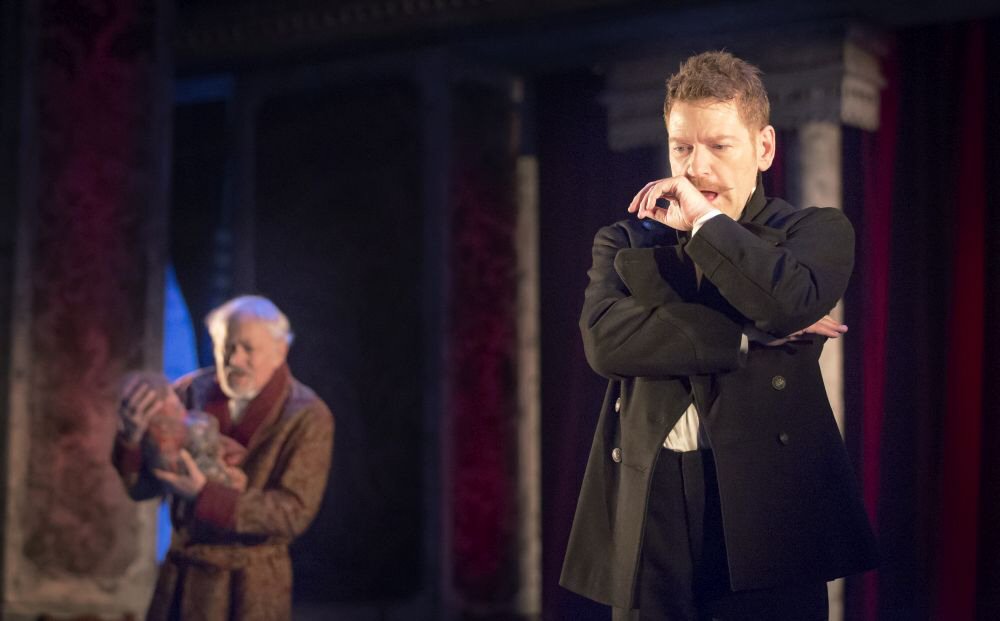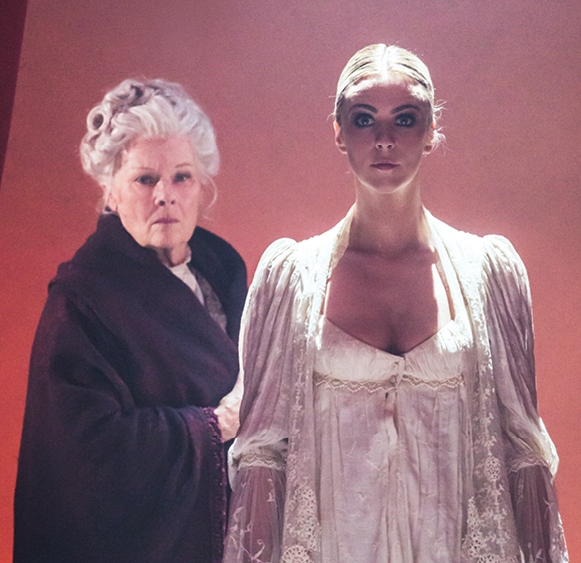|
One of the joys of being old is the occasional discovery of something lovely, something you never knew existed. That’s what happened Sunday when we saw the filmed performance of Shakespeare’s “The Winter’s Tale” -- not in London but in Kew Gardens, Queens. I am embarrassed to admit I never knew the play, after four years of being around the wonderful Shakespeare Festival at Hofstra College in the late ‘50’s. That was the biggest thing on our little campus, because the president, John Cranford Adams, was a noted Shakespeare scholar, and had made sure we had a Globe Theatre in the new playhouse (soon deservedly named for him). I can still see friends in costume, wielding swords, wooing, declaiming. (Francis Coppola was backstage, learning his craft.) However, in five decades of seeking out Shakespeare all over London, I still had to verify that the “The Winter’s Tale” was his, when it popped up Sunday at the deus-ex-machina art-film house in a funky corner in Queens that reminds me of some blessedly static part of London. Yes, it was Shakespeare. My wife had seen a version at the pit at the Barbican. The plot was for me to discover. Branagh was excellent as the jealous king who touches off the tragedy but the star was Judi Dench as the wise elder who speaks truth to the king. She is 80; her voice and psychic power could cut and polish a diamond. The elders in the movie house seemed to love Dench. They spoke English and Russian and other languages of our city; the lady next to me was Jamaican. No plot giveaways here. I will only say that I remember tearing up near the end of Stoppard’s “Arcadia” a few decades back when the tectonic plates of two separate centuries, two sets of people at a country estate, gracefully overlap. I wish I could say, “Don’t miss this,” but this was essentially a one-off item that may pop up elsewhere at the rare theaters that provide quality films. (The movies in my town are mostly banal trash.) To find quality performances, one has to monitor the schedules for the Metropolitan Opera, the National Theatre Live, the Bolshoi Ballet, and now Branagh’s enterprise in the gorgeously renovated Garrick Theatre at Charing Cross. (My London rellies saw a sold-out “The Winter’s Tale” on Christmas Eve and reported that rare British happening, a standing ovation.) I didn’t stand in the movie house in deepest Queens on Sunday – too busy wiping away a few tears before the house lights came back on.  Kenneth Branagh/ Photo by Johan Persson Kenneth Branagh/ Photo by Johan Persson
Josh Rubin
1/5/2016 02:17:42 pm
Nice story. Shakespeare, well-performed, is always a treat. My family and I also encountered a "new" play of the bard's: As You Like It. I had neither seen it nor read it before, but we just saw the National Theater's production in London and it is quite imaginative and witty, particularly once the set is transformed and we enter the forest of Arden. My parents tell me that they will be seeing it soon through a screening from the National Theater, though I am not sure where. Through the miracle of modern communications, all the world is indeed now a stage.
George Vecsey
1/5/2016 05:14:55 pm
• Hi, Josh: Thanks for the note. The series you mention is National Theatre Live, with outlets all over the world: keeps us sane in the New World. 1/5/2016 05:02:28 pm
George
George Vecsey
1/5/2016 05:18:29 pm
Alan, the Rubins have landed. 1/5/2016 09:19:40 pm
George,
Elliott Kolker
1/6/2016 01:39:10 pm
Not knowing anything about what had occurred the previous day, when I turned on the radio and heard,"...he said "I will own it till the day I die and then another York will own it," I thought I had inadvertently tuned to NPR and stumbled onto a reading of Lancaster's Equal Time Rebuttal of the Duke of York's "Soliloquy on an English Crown Found in the Gutter and Placed on My Head" in a recently discovered portion of a previously unknown manuscript by Shakespeare of a play he wrote about the War of the Roses until I realized I was still tuned to KNBR Sports Radio and it was Fitz and Brooks during their regularly scheduled show discussing Jed York's 49er Apologia: "I'm in Charge Here Because Grandaddy was Successful" press conference from the day before. .
George Vecsey
1/7/2016 09:27:02 am
Dear Elliott Kolker: Just what this site has always needed: a poet who can detect Shakespearean overtones in this prosaic sports world. Please feel free to spot glimmers of Iago, Coriolanus, Falstaff, Lear, Prince Hal and some of the strong women of Shakespeare. Go forth.
Josh Rubin
1/7/2016 12:29:36 pm
What a nice parlor game, equating Shakespeare characters with figures from the world of sports. My nomination:
Elliott Kolker
1/8/2016 05:38:03 am
You are onto something, Josh. Your Shakespearean characters and figures from the world of sports mashed-up my actors and characters in movies to cast yourself or others (see below) 2/10/2016 01:47:41 am
Thanks for sharing useful information and it is very helpful... Comments are closed.
|
Categories
All
|










